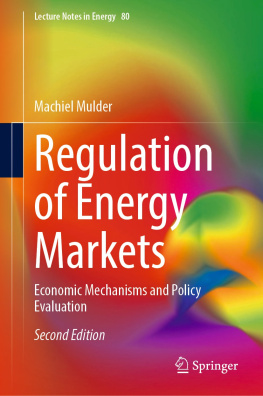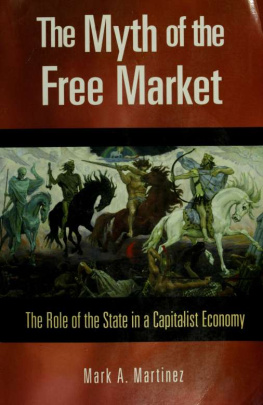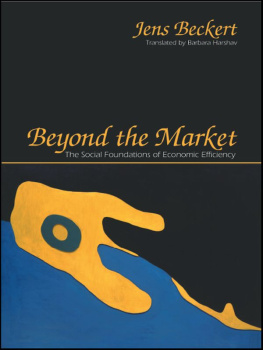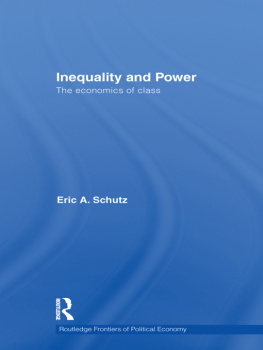The Invisible Hand of Power: An Economic Theory of Gate Keeping
M ODERN H ETERODOX E CONOMICS
Series Editor: Carol M. Connell
T ITLES IN THIS S ERIES
1 Money as Organization, Gustavo Del Vecchios Theory
Gianfranco Tusset
2 Financial Crisis and the Failure of Economic Theory
ngel Rodriguez, Jorge Turmo and Oscar Vara
F ORTHCOMING T ITLES
The Problem of Production: A New Theory of the Firm
Per L. Bylund
The Birth of Economics as a Social Science: Sismondis Concept of Political Economy
Francesca Dal Degan
www.pickeringchatto.com/mhe
CONTENTS
To Olga, with gratitude for her devotion
ACKNOWLEDGEMENTS
I am grateful to both Commissioning Editors of Pickering & Chatto involved in this publishing project. Philip Good encouraged me to write the present book after reading a draft of what would later become one of its chapters. Sophie Rudland provided valuable assistance at the final stage of my work and showed a willingness to adjust to my changing schedule. Pickering & Chattos reviewers, including Professor Carol Connell, the series editor, made a number of comments and suggestions that helped me to determine the books final structure and line of reasoning. I would also like to thank Professor Herbert Gintis, External Professor at Santa Fe Institute, and Professor of Economics at the Central European University, for his reading of an early draft of Chapter 2 and comments that he made. Professor Christopher Brown, the editor of the Journal of Economic Issues, helped fix a few problems in an earlier version of two sections in Chapter 3 that were published as a stand-alone article in this journal (A. Oleinik, The 2008 Financial Crisis Through the Lens of Power Relationships, Journal of Economic Issues, 47:2 (2013), pp. 46574). An earlier version of two sections in Chapter 5 was also published in the same journal (Access to Justice as a Form of Inequality, Journal of Economic Issues, 48:2 (2014), pp. 40512). The previously published material is reprinted with permission from the publisher, M. E. Sharpe. Sheryl Curtis of Les Communications WriteTouch (Montral) as usual did a great job with the style editing.
LIST OF FIGURES AND TABLES
1 VISIBLE AND INVISIBLE HANDS OF POWER: THEORETICAL PRELIMINARIES
Power is one of those things without which our lives would be unthinkable. Power in its various forms structures our interactions with children at home, students or instructors in classrooms, superiors and subordinates at work, and public servants in government offices. It would be difficult to find any social relationship that is absolutely free of power. Finding situations in which power turns out to be irrelevant involves thinking counterfactually, i.e. pretending that things are different from the way we know they are. It is no coincidence that counterfactual thinking represents an important analytical tool used by scholars studying power. Steven Lukes, namely, starts his analysis of power by asking what would have happened in a relationship if there were no application of power by one of the parties involved (S. Lukes, Power: A Radical View (1974; Houndmills: Palgrave Macmillan, 2005), pp. 434; see Chapter 2, Section 4, endnote 2). Peter Morriss offers the following definition of counterfactual thinking: The counterfactual asserts that we are to pretend things are different from the way we know they are (if Verdi and Berlioz were compatriots), and then asserts a conclusion (they would be Italian) that follows if, and only if, we pretend things are different in some specific way, where the counterfactual itself is completely silent about whether this is the right way of pretending things are different (P. Morriss, Power: A Philosophical Analysis (New York: St Martins Press, 1987), p. 73).
Despite its importance and omnipresence, our knowledge about power is limited, especially when comparing it with progress in generating knowledge about the other determinants of human behaviour. Scientists have managed to decode the complete DNA sequence of a single human being, but they still know little about the mechanics of power and its possible forms. The list of the possible explanations for this relative ignorance includes the contested character of the concept of power and the lack of commonly accepted taxonomies.
Scholars studying power acknowledge the essentially contested character of this concept. She is used throughout this book instead of the rather awkward constructions he/she or s/he. wants. In more general terms, power refers to ones capacity to go ones own way all the time, to have the upper hand in all relationships, including those with the material environment.
As in the case of the plurality of definitions, taxonomies of power also abound. There is no universally acceptable one, no analogue to the periodic table of the chemical elements in the studies of power, however. As a result, the existing taxonomies serve to address specific issues without covering all possible forms of power. R. Collins, The Sociology of Philosophies: A Global Theory of Intellectual Change (Cambridge, MA: The Belknap Press of Harvard University Press, 1998), p. 535. According to this author, the two sufficient components are research technology and mathematical modelling. The empirical data on power tend to be scarce. Furthermore, these data refer to discrepant elements that do not form a coherent picture. We know something about some elements of power, but little about power as a whole.
For instance, scholars have collected a significant amount of empirical data on a particular dimension of power, power distance, in various managerial cultures. Power distance refers to the extent to which the less powerful members of institutions and organizations within a country expect and accept that power is distributed unequally. It takes enormous work to measure the concepts of congruence theory (W. M. Reisinger, Congruency Theory as a Perspective on Russian Politics, in H. Eckstein, F. J. Fleron, E. P. Hoffmann and W. M. Reisinger (with R. Ahl, R. Bova and P. Roeder), Can Democracy Take Root in Post-Soviet Russia? Exploration in StateSociety Relations (Lanham, MA: Rowman & Littlefield, 1998), pp. 15162, on p. 152.
This book is intended to be a small building block in our fragmented knowledge about power. More specifically, it contributes to unveiling invisible forms of power and discusses the situations in which power takes the least obvious forms. The metaphor of power as an upper, guiding hand can be made more nuanced. The guiding hand either helps individuals to better achieve their private and public interests or, on the contrary, undermines their chances of doing so. The former hand is benevolent; the latter hand is unkind and antagonistic. If individuals are aware of the guidance, they see the hand and understand its effects on their behaviour. They may also be ignorant of the existence of the guiding hand because of its invisible character.
Adam Smiths famous arguments on the benefits of the self-interested behaviour illustrate the idea of a benevolent invisible hand: A. Smith, Inquiry into the Nature and Causes of the Wealth of Nations (1776; New York: Modern Library, 1937), book 4, ch. 2, p. 423.
As every individual, therefore, endeavours as much as he can both to employ his capital in the support of domestic industry, and so to direct that industry that its produce may be of the greatest value; every individual necessarily labours to render the annual revenue of the society as great as he can. He generally, indeed, neither intends to promote the public interest, nor knows how much he is promoting it. By preferring the support of domestic to that of foreign industry, he intends only his own security; and by directing that industry in such a manner as its produce may be of the greatest value, he intends only his own gain, and he is in this, as in many other cases, led by an invisible hand to promote an end which was no part of his intention. Nor is it always the worse for the society that it was no part of it. By pursuing his own interest he frequently promotes that of the society more effectually than when he really intends to promote it.










